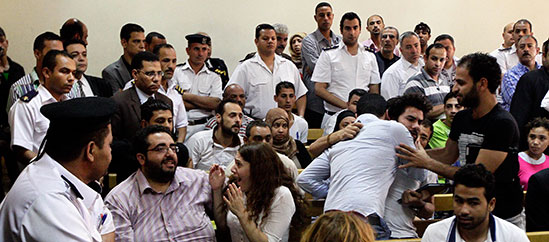NGO Case Criminalizes Human Rights Work
By Jean-Paul Marthoz
A criminal case that was launched under the previous transitional military government has cast a shadow over the current government, with its implications that international human rights and democracy workers are somehow foreign agents working against national security.

In December 2011, security forces acting under orders of the military ruling council shut down the offices of 10 NGOs, seizing documents, computers, and cell phones. U.S.-based organizations—such as Freedom House, the National Democratic Institute, and the International Republican Institute—were among the targeted NGOs, as was the German Konrad Adenauer Foundation.
ON THE DIVIDE
• Table of Contents
In print
• Download the pdf
In other languages
• العربية
Three months later, in a move that shocked the human rights community, authorities filed criminal charges against 43 people on claims that they were unlawfully operating internationally financed programs. The NGOs were operating democracy-building and human rights projects with local partners. The defendants included Sherif Mansour, who worked for Freedom House at the time and who is now CPJ’s Middle East and North Africa program coordinator. The authorities used “a discredited Mubarak-era law” to launch the case, said Joe Stork, Human Rights Watch’s deputy Middle East and North Africa director. Russia has recently used similar tactics, thwarting international human rights work by branding it a foreign threat.
Many observers expected the charges to be dismissed after the Muslim Brotherhood government was voted into power in June 2012. The United States, after all, provides $1.5 billion in annual military and economic aid. The country’s international image has significant bearing on its large tourism sector and its standing as a leading diplomatic actor in the region.
In June 2013, however, a Cairo Criminal Court judge convicted the NGO workers and imposed prison sentences of one to five years on charges of “illegally operating in Egypt and receiving foreign funding without authorization.” The court verdict accused the NGOs of working to “undermine Egypt’s national security and lay out a sectarian, political map that serves U.S. and Israeli interests.” Mansour, who is an Egyptian-born U.S. citizen based in New York, was convicted in absentia, as were more than two dozen others.
“We stand fully with Sherif Mansour and will support him in his efforts to secure justice for himself and the other defendants,” said CPJ Executive Director Joel Simon after the verdict was delivered. “We trust that this unjust verdict will be reversed on appeal.” Freedom House said the prosecution was motivated by the “determination to shut down civil society. None of those indicted did anything wrong. They were simply working with Egyptians to help them realize their dream of a free Egypt.”
Jean-Paul Marthoz is CPJ’s Brussels-based senior adviser.